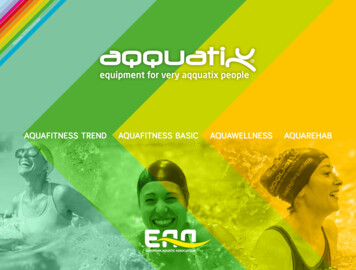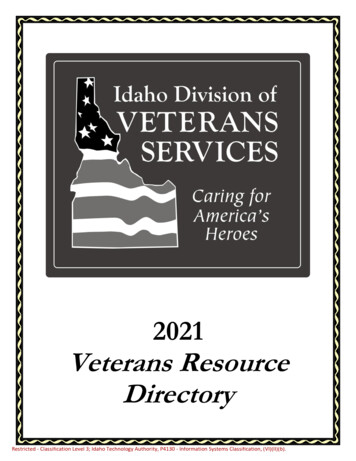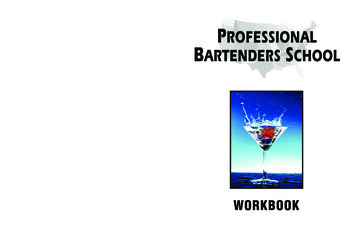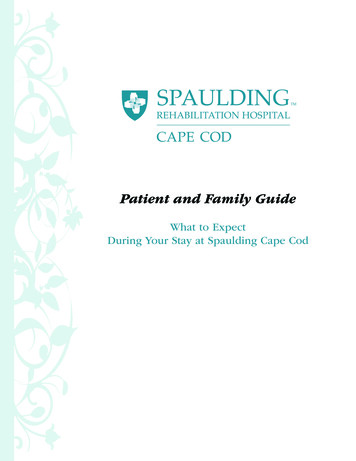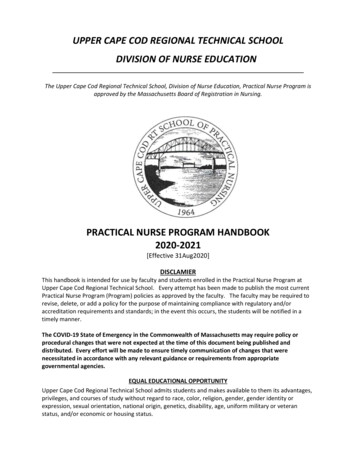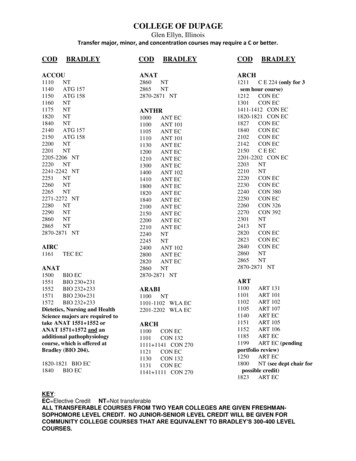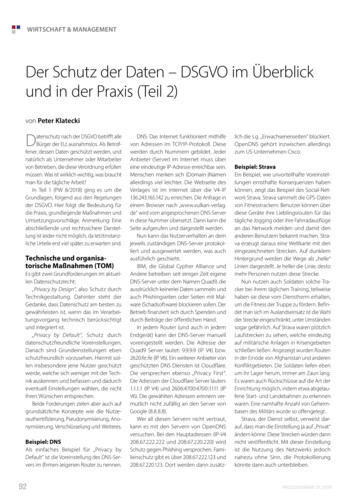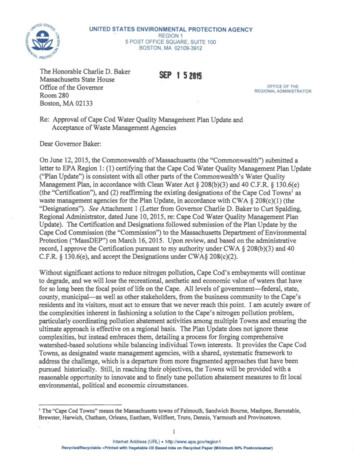
Transcription
UNITED STATES ENVIRONMENTAL PROTECTION AGENCY.REGION 15 POST OFFICE SQUARE, SUITE 100BOSTON, MA 02109-3912The Honorable Charlie D. BakerMassachusetts State HouseOffice ofthe GovernorRoom280Boston, MA 02133SEP 1 52115OFFICE OF THEREGIONAL A DM INISTRATORRe: Approval of Cape Cod Water Quality Management Plan Update andAcceptance of Waste Management AgenciesDear Governor Baker:On June 12, 2015, the Commonwealth of Massachusetts (the "Commonwealth") submitted aletter to EPA Region 1: (I) certifying that the Cape Cod Water Quality Management Plan Update("Plan Update") is consistent with all other parts of the Commonwealth's Water QualityManagement Plan, in accordance with Clean Water Act§ 208(b)(3) and 40 C.F.R. § 130.6(e)(the "Certification"), and (2) reaffirming the existing designations ofthe Cape Cod Towns 1 aswaste management agencies for the Plan Update, in accordance with CWA § 208(c)(l) (the"Designations"). See Attachment 1 (Letter from Governor Charlie D. Baker to Curt Spalding,Regional Administrator, dated June 10, 2015, re: Cape Cod Water Quality Management PlanUpdate). The Certification and Designations followed submission of the Plan Update by theCape Cod Commission (the "Commission") to the Massachusetts Department of EnvironmentalProtection ("MassDEP") on March 16, 2015. Upon review, and based on the administrativerecord, I approve the Certification pursuant to my authority under CWA § 208(b)(3) and 40C.F.R. § 130.6(e), and accept the Designations under CWA§ 208(c)(2).Without significant actions to reduce nitrogen pollution, Cape Cod's embayments will continueto degrade, and we will lose the recreational, aesthetic and economic value of waters that havefor so long been the focal point of life on the Cape. All levels of government-federal, state,county, municipal-as well as other stakeholders, from the business community to the Cape'sresidents and its visitors, must act to ensure that we never reach this point. I am acutely aware ofthe complexities inherent in fashioning a solution to the Cape's nitrogen pollution problem,particularly coordinating pollution abatement activities among multiple Towns and ensuring theultimate approach is effective on a regional basis. The Plan Update does not ignore thesecomplexities, but instead embraces them, detailing a process for forging comprehensivewatershed-based solutions while balancing individual Town interests. It provides the Cape CodTowns, as designated waste management agencies, with a shared, systematic framework toaddress the challenge, which is a departure from more fragmented approaches that have beenpursued historically. Still, in reaching their objectives, the Towns will be provided with areasonable opportunity to innovate and to finely tune pollution abatement measures to fit localenvironmental, political and economic circumstances.1The "Cape Cod Towns" means the Massachusetts towns of Falmouth, Sandwich Bourne, Mashpee, Barnstable,Brewster, Harwich, Chatham, Orleans, Eastham, Wellfleet, Truro, Dennis, Yarmouth and Provincetown.Reeycl eeyclabl lntemet Address (URL) http://www.epagov/region 1 Printed with Vegetable 011 Baud lnu on Recycled Paper (M lnlmum 30% Po.tconaumer)
Given the scope of the Cape's nitrogen problem, and the environmental public policycomplexities associated with solving it, I find the approach adopted by the Commonwealth in thePlan Update to be reasonable and appropriate.By voluntarily opting to update the existing Section 208 Cape Cod Water Quality ManagementPlan, which was originally approved in 1978, the Commonwealth has demonstrated itscommitment to facilitate, support, and participate in a regionally-based solution to the Cape'snitrogen pollution problem. The Commonwealth specifically directed an update "to facilitate aregional approach" to nitrogen pollution problems on Cape Cod. See Attachment 2 (Letter fromKen Kimmel, Commissioner, MassDEP, to Paul Niedzwiecki, Cape Cod Commission, datedJanuary 30, 2013). Further, in directing the Plan Update be prepared, the Commonwealthspecifically identified funding and implementation as topics that should be addressed. In itsCertification, the Commonwealth expressly reaffirmed this commitment, stating, "MassDEP iscommitted to developing a watershed-based permitting program to address nitrogen managementmeasures in accordance with the Massachusetts Legislature's directive of Chapter 259 of theActs of2014, Section 2A, item 2200-0135."2 See Attachment 1. MassDEP has alreadycommenced work on developing this program. See Attachment 3 (Letter Report, dated April 22,2015, re Massachusetts Department of Environmental Protection's Report to the Joint Committeeon Environment, Natural Resources and Agriculture on Statutory Changes Necessary toImplement a Watershed Permitting Approach). The Letter Report, at p. 2, concluded:"The Department reports that it has identified adequate authority to establish such a newwatershed-based permitting program under existing Massachusetts Clean Waters Act andthat it does not anticipate a need for any statutory changes at this time to fully implementa watershed-based permitting approach for Cape Cod."Furthermore, at EPA's request, MassDEP has detailed the measures it could take to ensuretimely implementation of the Plan Update, including the timeframe envisioned for taking suchactions. See Attachment 4 (Letter from Gary Moran, Deputy Commissioner, MassDEP, toDeborah Szaro, Deputy Regional Administrator, EPA Region 1, dated August 14,2015, re:Section 208 Cape Cod Areawide Water Quality Management Plan Update). In approving theCertification and·accepting the Designations, I have taken note ofthe Legislature's directive toMassDEP to develop a watershed permitting program, as well as the Commonwealth'srepresentations regarding the creation of any additional authorities-beyond those alreadypossessed by the Cape Cod Towns to implement necessary nitrogen controls, as well as thecommitment to take other appropriate actions, in the event they are found to be necessary as thecomplex process of implementation unfolds. 3In coming to my decision, I have also considered the ongoing role that will be played by theCape Cod Commission during the implementation phase.2In Chapter 259 ofthe Acts of2014, Section 2A, item 2200-0135, the Massa :husetts Legislature requires that"[MassDEP] shall develop a watershed permitting approach to address and optimize nitrogen management measuresintended to restore water quality to meet applicable water quality standards in watersheds included in an approachedarea wide nitrogen management plan developed pursuant to 208 ofthe federal Clean Water Act[.]"3The Commonwealth has in addition committed 250,000 dollars toward monitoring and pilot nutrient reductionprojects on Cape Cod, which I regard as further evidence ofthe Commonwealth's commitment to implementation.2
The Commission is available to help the Towns coordinate planning, monitoring andimplementation, and will assist with the creation of interrnunicipal agreements, as appropriate, inorder to facilitate a regionally effe·ctive solution to the Cape's nitrogen problem. This process ofplanning and implementation is already underway, as described in Chapter 8 ofthe Plan Update.Upon certification of the Section 208 Plan Update by the Governor, the Cape Cod Towns have12 months to develop "watershed reports" that outline potential scenarios for each of thewatersheds for which they are responsible. The Commission has offered to assist the Townswith the development of watershed reports and creation of Watershed Teams, and can help withnutrient reduction scenario development, watershed agreements, permitting of teclmologies,monitoring and financing. Towns that use a Watershed Team will receive the benefit ofanexpedited regulatory review by the Commission based on its consistency with the Plan Update and access to new funding sources available for implementation. If Towns do not complete awatershed report or request a team, the Commission will complete an interim report for the area,and will require those Towns to submit their plans to the Commission for a 208 Plan Updateconsistency review as part of the Commission's development review process. The Commissionwill issue an implementation report in June 2016 describing the actions ofwaste managementagencies to date. The role the Commission will play during the implementation phase isdescribed in greater detail in Attachment 5 (Letter from Paul Niedzwiecki, Cape CodCommission, to Ken Moraff, EPA Region 1, dated August 25,2015, re Cape Cod Water QualityManagement Plan Update), the representations in which I specifically considered in approvingthe Plan Update and accepting the Designations.Supplementing the foregoing, the Region will assess at reasonable intervals the actions beingtaken by the Commonwealth and Towns to implement the procedures and actions called for inthe Plan Update to reduce nitrogen loads for a period of six years beyond the date oftheRegion's acceptance of the Cape Cod Towns as wastewater management agencies designatedunder CWA § 208(c)(2). Based on such assessments, and in the Region' s sole discretion, theRegion may notify the Commonwealth of additional actions to implement the approved Section208 plan/update, or that a new update of the Section 208 Plan is needed (and resubmission to theRegion of one or more designated Management Agencies for EPA acceptance). TheCommonwealth, Commission and Cape Cod Towns should be aware that EPA specificallyintends to track plan implementation utilizing the recommended milestones set forth in theCommission' s August 25 letter. See Attachment 5 at pp. 8-9. EPA committed to assessimplementation in the Settlement Agreement, filed November 17, 2014, in United States DistrictCourt for the District of Massachusetts, in connection with Conservation Law Foundation v.United States Environmental Protection Agency, et a/., Action No. 1: 13-12704, andConservation Law Foundation, et al. v. United States Environmental Protection Agency, et al. ,Action No. 1:11-cv-11657. To carry out the assessment, the Region will in part rely on quarterlyprogress reports commencing January 15,2016 by the Commission and MassDEP, which maybe submitted jointly or separately. The Region has also agreed to participate in semi-annualmeetings and a Technologies Summit on the Cape to be convened by the Commission toevaluate implementation progress.The Region expects close contact and cooperation with the Commonwealth, the Commission,Barnstable County, the Cape Cod Towns and other stakeholders as the process of implementingthe Plan Update progresses through its initial stages. ,3
Please do not hesitate to contact Johanna Hunter of EPA's Office of Ecosystem Protection at(617) 918-1041 or Samir Bukhari of the Office of Regional Counsel at (617) 918-1 095 if youshould have any questions regarding this letter. . H. Curtis SpaldingRegional Administratorcc:Senator Ed Markey, Member of United States SenateSenator Elizabeth Warren, Member of United States SenateMr. Bill Keating, United States House of RepresentativesSecretary Matthew A. Beaton, Executive Office of Energy and Environmental AffairsCommissioner Martin Suuberg, Massachusetts Department of Environmental ProtectionDeputy Commissioner Gary Moran, Massachusetts Department of Environmental ProtectionMs. Mary Pat Flynn, Commissioner of Barnstable CountyMs. Sheila Lyons, Commissioner of Barnstable CountyMr. Leo Cakounes, Commissioner of Barnstable CountyMr. Paul Niedzwiecki, Executive Director of Cape Cod CommissionMr. Tom Lynch, Town Manager of BarnstableMs. Jessica Rapp Grassetti, President of Town Council, Town of BarnstableMr. Tom Guerino, Town Administrator of BourneMr. Stephen Mealy, Chairman of Board ofSelectmen, Town of BourneMr. Charles Sumner, Town Administrator of BrewsterMr. Ben deRuyter, Chairman of Board of Selectmen, Town of BrewsterMs. Jill Goldsmith, Town Manager of ChathamMr. Jeffrey Dykens, Chairman of Board of Selectmen, Town of ChathamMr. Richard White, Town Administrator of DennisMr. Paul McCormick, Chairman of Board of Selectmen, Town of DennisMs. Sheila Vanderhoef, Town Administrator of EasthamMs. Elizabeth Gawron, Chairman of Board of Selectmen, Town of EasthamMr. Julian Suso, Town Manager of FalmouthMr. Doug Jones, Chairman of Board of Selectmen, Town of FalmouthMr. Christopher Clark, Town Administrator ofl:farwichMr. Peter Hughes, Chairman of Board of Selectmen, Town of HarwichMr. Rodney Collins, Town Manager of MashpeeMr. John Cahalane, Chairman of Board of Selectmen, Town of MashpeeMr. John Kelly, Town Administr tor of OrleansMr. David Dunford, Chairman of Board of Selectmen, Town of OrleansMr. David Panogore, Town Manager of ProvincetownMr. Thomas Donegan, Chairman of Board ofSelectmen, Town of ProvincetownMr. George Dunham, Town Manager of Sandwich4
Mr. Frank Pannorfi, Chairman of Board of Selectmen, Town of SandwichMs. Rae Ann Palmer, Town Administrator of TruroMr. Paul Wisotzky, Chairman of Board of Selectmen, Town of TruroMr. Harry Terkanian, Town Administrator of WellfleetMr. Paul Pilcher, Chairman of Board ofSelectmen, Town of WellfleetMr. William Hinchey, Town Administrator of YarmouthMr. Erik Tolley, Chairman of Board of Selectmen, Town of YarmouthMr. Andrew Gottlieb, Executive Director of Cape Cod Water Protection CollaborativeMr. Christopher Kilian, Vice President and Director of Conservation Law Foundation VermontMs. Caitlin Peale Sloan, Staff Attorney of Conservation Law Foundation Massachusetts5
ATTACHMENT 1JUN 1 2 2015OFFICE OF THE GOVERNORCOMMONWEALTH OF MASSACHUSETTSSTATE HOUSE BOSTON ,MA 02133(617) 725-4000CHARLES 0 . BAKERGOVERNORKARYN E. POLITOLIEUTENANT GOVERNORJune 10,2015Curt Spalding, Regional AdministratorUSEPA Region I -New England5 Post Office SquareMail Code: ORAOI -4Boston, MA 02109-3912Re: Section 208 Cape Cod Areawide Water Quality Management Plan UpdateDear Administrator Spalding:I am writing to submit for approval the Cape Cod Area Wide Water Quality Management PlanUpdate (" Plan Update") developed by the Cape Cod Commission (" CCC"). CCC submitted thePlan Update to the Massachusetts Department of Environmenta l Protection ("MassDEP") forrev iew on March 16,2015. The !Plan Update builds upon the 1978 Water Quality Management( " WQM") Plan prepared by the Cape Cod Planning and Econom ic Development Commission,predecessor to the CCC.Based on MassDEP's review, I hereby certify the P lan Update pursuant to § 208(b)(3) of theFederal Clean Water Act, 33 U.S.C. § I 288(b)(3), and 40 C.F.R. § 130.6(e). My certification issubject to the following:I. The Plan Update includes a number of recommendations, some of which call forlegislative action, some of which call for action by other agencies and e ntities outside ofthe purview of the MassDEP, and some of which call for actions by the MassDEP,includ ing changes to MassDEP rules and regulations. MassDEP is committed todeveloping a watershed-based permitting program to address nitrogen managementmeasures in accordance with the Massachusetts Legislature 's directive in Chapter 259 ofthe Acts of2014, Section 2A, item 2200-0135. However, this certification of the PlanUpdate shou ld not be construed as necessarily approving or endorsing every aspect of thePlan Update or any specific recommendation therein.2. This correspondence also affirms that the local communities identified as the designatedmanagement agencies ("DMAs") under the 1978 WQM Plan will continue as the DMAs
ATTACHMENT 1for purposes of the P lan Update. My certification ofthe Plan Update should not beconstrued as waiving or otherwise affecting the Governor's right to de-designate anyDMA or to designate any additional DMAs, as warranted, or otherwise affecting therights of any DMA or other entity in this regard.For additional information, please contact Martin Suuberg, Commissioner of the Department, at(617) 292-5856.Sincerely, 7J.l),J-JCharles D. BakerGovernor
ATTACHMENT 2Commonwealth of MassachusettsExecutive Office of Energy & Envir'onmental AffairsDepartment of Environmental ProtectionOne Winter' Str'eet Boston, MA 02108 617-292-5500DE:VAL L f'I\TniCKniCH/\nD K SULLIVJ\f\.J JnSocretaryGovernorliMOIHY11.MUf \llJ\YKENNETH L. KIMMELLCornrnisGiorwrLioulenunt. Gover1mrJanuary 30, 2013Paul NiedzwickiExecutive DirectorCape Cod Commission3225 Main StreetBarnstable, MA 02630Dear Mr. Niedzwicki:On behalf of Governor Patrick and Secretary Rick Sullivan of the Executive Office of Energyand Environmental Affairs, I am writing to direct the Cape Cod Commission to prepare anupdate to the 1978 Water Quality Management Plan for Cape Cod to address a criticalproblem-the degradation of Cape Cod's water resources from excessive nutrients. Thisdirective accompanies the Commonwealth's commitment to provide the Cape Cod Commissionwith 3,350,000 from the Water Pollution Abatement Tmst to fund this update.As you are well aware, nutrient contamination is one of the the most pressing environmentalchallenges facing Cape Cod. Increased population and development in those areas surroundingCape Cod's estuaries have resulted in excessive amounts of nutrients being discharged into thesesensitive resources, causing eutrophication and prompting the accelerated growth of nuisanceplants, weeds and algae, using up much of the oxygen in the water. This forces out finfish,shellfish, and indigenous plant species. The result -water bodies that violate state water qualitystandards, are visually displeasing, smell bad, and cannot support the natural uses that theestuaries have historically offered. This is not only an environmental problem-ifleftunchecked, it is likely to harm the Cape's economy through a decline in fishing, shellfishing,tourism, and property values.The primary water quality problem on Cape Cod stems from nitrogen contamination. Nitrogenfrom septic systems, wastewater treatment plants, lawns and stormwater leaches intogroundwater and flows underground and is discharged to surface water bodies. While nitrogencomes from a variety of sources, on Cape Cod the predominant sources are on-site septicsystems. Approximately 85 percent of the wastewater flow into Cape Cod's embayments comesfrom on-site septic systems.This information is avallahleln alternate format. Call Michelle Waters-Ekanem, Dlverslly Director, at 617-292-5751. TOO# 1-866-539-7622 or 1-617-574-6868MassDEP Website: W\'1\'/.mass.gov/depPrinted on Recycled Paper
ATTACHMENT 2Over the past decade, the Massachusetts Depmtment of Environmental Protection (MassDEP)has been working closely with Cape Cod communities and the University of Massachusetts,through the Massachusetts Estuaries Project, to provide communities with the scientific studiesthey need to effectively address the specific water quality issues impacting each estuary. Thesestudies clearly demonstrate the need to take action now. Based on the analyses performed todate, we estimate that more than 90 percent of the Cape's estuaries do not meet water qualitystandards.It has become equally clear that the most effective and affordable approach to this problem is aregional effmt. Nitrogen-loading is a Cape-wide problem, with estuaries and watersheds oftencrossing municipal boundaries. A regional approach to these problems will: Facilitate a more holistic, watershed-based approach to addressing nitrogen impacts;Limit the amount of infrastructure needed by sharing of wastewater facilitiestargeted towards areas of greatest need;Allow greater opportunity for solutions involving decentralized and innovativeapproaches, and continued use of conventional septic systems where appropriate;andAchieve greatest economies of scale, and spread costs over the largest number ofusers.To most effectively facilitate a regional approach, MassDEP is directing the Cape CodCommission, as the successor agency to the Cape Cod Planning and Economic DevelopmentCommission ("CCPEDC"), to prepare an update to the 1978 Water Quality Management Plan forCape Cod.Section 208 of the federal Clean Water Act authorizes State Governors to identify areas that havesubstantial water quality control issues and designate a platming entity to develop effective waterquality management plans. Before a State Governor may fmward such a plan to EPA forapproval, § 208 also requires the Governor to designate suitable management agencies toimplement the plan, based upon the plan's reconunendations. The intent of this process is togenerate a unified framework for activities to abate water pollution in a geographic area andintegrate technical needs for pollution control with management arrangements capable ofimplementing those controls.In 1975, Governor Dukakis designated the CCPEDC to create a regional water qualitymanagement plan for Cape Cod waters. The 1978 Plan, created by CCPEDC, was certified bythe Governor and approved by EPA in accordance with § 208. The Plan relies primarily ondesignating existing local authorities for implementation and identified the need for furtherinvestigation into the possibility of strengthening the regional role in areas under the authority ofthe towns.Since 1978, extensive scientific study has demonstrated that nutrient pollution on Cape Cod,especially nitrogen pollution, has become a far more serious problem, giving rise for the need todevelop new cost-effective and envirornnentally sound approaches to managing water quality in
ATTACHMENT 2the region. The updated plan should include a comprehensive analysis of the factors contributingto water quality degradation, but prioritize management of controllable nutrients due to thecutTent conditions in the region. The updated plan should: Prioritize water resources, identifYing the most impaired or endangered, and the actionsto achieve water quality goals as quickly as possible;Limit the amount of infrastructure needed by prioritizing those areas requiring "shared"systems to restore water quality;Provide an oppmtunity to more fully evaluate decentralized and innovative approaches,as well as the continued use of conventional septic systems, where appropriate;Identify preferred solutions for nutrient management in nitrogen sensitive watersheds;Achieve greatest economies of scale, and identify methods to equitably share costsamong all parties benefitting from the improvements;Feature a robust public patiicipation process, including a facilitated outreach effmi,watershed level advisory committees, and extensive public input oppmtunities to fullyconsider all views and input, and to build consensus for identified solutions;Identify ways in which solving the wastewater problem could also address otherchallenges facing the Cape. As one example, the updated plan should explore the use ofanaerobic digesters at new or existing wastewater treatment plants to generate low-cost,renewable energy and help the Cape address organic waste disposal challenges; andIdentify funding and implementation mechanisms.The development of the updated regional plan is a substantial undetiaking that will requiresignificant resources. The Executive Office of Energy and the Envirmrmental Affairs andMassDEP are committed to working with the Cape Cod Commission as it undertakes this criticaltask. We are pleased that the Massachusetts Water Pollution Abatement Trust voted on January16,2013, to authorize 3.35 million to support the development of the updated regional plan andrelated efforts subject to the signing of a Memorandum of Understanding regarding the scope ofservices, corresponding project plan and budget, and disbursement of funds. MassDEP will playa significant role in development of the plan, providing input, specific requirements, and generaloversight. We look forward to meeting with you in the near future to discuss the plan scope andcontract in more detail.On behalf of the Patrick-Murray Administration, I want to commend Barnstable County, theCape Cod Commission, the Cape Cod Water Protection Collaborative, and the Cape Codlegislative delegation for your efforts to assist Cape communities in addressing these issues on aregional, watershed basis. We are pleased that the Commonwealth is able to provide additionalresources to support your effmis. We look forward to continuing to work with you, Cape electedofficials, communities, stakeholders, and residents in this critical effmi to develop a plan thatwill restore and protect Cape Cod's water resources in an acceptable phased approach thatintegrates affordability, appropriate infrastmcture and growth management.
ATTACHMENT 2CommissionerCc: Senate President Therese MurrayTreasurer GrossmanScott JordanSenator WolfRepresentative PeakeRepresentative MaddenRepresentative TurnerRepresentative VieiraRepresentative HuntRepresentative Manna!Secretary SullivanAndrew GottliebMary FlynnSheila LyonsBill DohertyCutt Spalding
ATTACHMENT 3Commonw ealth of Massa chu settsExecutive Office of Energy & Environmental Affa irsDepartment of Environmental ProtectionOne Winter Street Boston, MA 0 2 108 617-292-5500Charles D . BakerGovernorMatthew A. Bea tonSec retaryK aryn E . PolitoLi eutenan t GovernorMartin Su ubergComm is sio nerApril 22, 2015Anne M. Gobi, ChairwomanJoint Committee on Environment, Natural Resources and AgricultureState House, Room 513Boston, MA 02133Paul A. Schmid, III , ChairmanJo int Committee on Environment, Natural Resources and AgricultureState House, Room 473FBoston, MA 02133Re: Massac hu setts Department of Environmental Protection's Report to the Joint Committee o nEnvironme nt, Natural Resources and Agriculture on Statutory Changes Necessary toImplement a Watershed P ermitting ApproachDear C hairwoman Gobi, Chairman Schmid and Honorable Members of the Committee:In Chapter 259 of the Acts of2014, Section 2A, in ite m 2200-01 35 , the Massachu sett sLegislature requires that " the department sha ll develop a watershed permitting app roac h toadd ress and optimize nitrogen ma nageme nt measu res intended to restore water quality to meetapp licable water quality standard s in watersheds included in an approved area wide nitrogenmanage me nt plan developed pursuant to secti on 208 of the federal Clean Water Act; andprovided further, that the depatiment s ha ll report to the joint committee on enviromnent, naturalresources and agriculture b y Ma rch 3 1, 2015 on a ny statutory changes it deems necessary to fullyimplement said watershed permitting appro ach. " I am submitting thi s letter in response to theLegislature's directive.As you are aware, in mid-Ma rch , the Cape Cod Commission submitted its Section 208 WaterQuality Management Plan Update to MassDEP. The submittal followed a public ·review andco mment period that included public hearin gs in each reg ion of the Cape last September andOctober. Recently, the Cape Cod Commission ho sted the One Cape Forum, a conferenceattended by over 300 peop le, including the majority of elected officials on the Cape, foc using onhow to effective ly impleme nt the final plan. MassDEP is now reviewing the Update.Thi s information Is availab le In alternate format. Ca l l Michelle Waters-Eka n em , Divers ity Director, at 617-292-5751 . TTY# MassRe l ay Service 1 -800 -439 -2370MassDEP W ebsite: www.mass.gov/depPrinted on Recycled Paper
ATTACHMENT 3The Department is in the process of developing a new watershed-based permitting approach toaddress and optimize nitrogen management measures intended to restore water quality on CapeCod. This is an approach that, in recent years, many communities have been asking be offered asan option. This new permitting mechanism will facilitate the comprehensive and innovativewastewater solutions envisioned in the 208 plan. These permits will: Allow communities increased opportunity to employ a greater range of solutions toaddress their water quality needs, including not only traditional centralized wastewatersystems, but also alternative approaches, such as green infrastructure, aquaculture, inletwidening, or permeable reactive barriers.Allow communities to consider and employ long-term remedial strategies. Rather thanthe traditional 5-year permit covering discharge points and limits, the watershed permitwill cover up to 20-year periods, incorporating a range of traditional and non-traditionalstrategies.Apply an adaptive management approach, acknowledging the uncertainties that may beassociated with some projects, carefully monitoring performance and assessing progressin a transparent fashion---and, if necessary, making changes in the approach orrecalibrating plans and projects to achieve water quality goals in a timely manner.The Department reports that it has identified adequate authority to establish such a newwatershed-based permitting program under the existing Massachusetts Clean Waters Act and thatit does not anticipate a need for any statutory changes at this time to fully implement awatershed-based permitting approach for Cape Cod. I appreciate the opportunity to update youon our progress and welcome any suggestions, questions, or additional conversation as weproceed.If you have any further questions regarding this matter, please contact Gary Moran, DeputyCommissioner, at (617) 292-5775.2
ATTACHMENT 4Commonwealth of MassachusettsExecutive Office of Energy & Environmental AffairsDepartment of Environmental ProtectionOne Winter Street Boston, MA 021 OS 617-292-5500Charles D. BakerGovernorMatthew A. BeatonSecretaryKaryn E. PolitoLieutenant GovernorMartin SuubergCommissionerAugust 14,2015Deborah Szaro, Deputy Regional AdministratorUS EPA Region I5 Post Office SquareMail Code: ORAOI-4Boston, MA 02109-3912Re: Section 208 Cape Cod Areawide Water Quality Management Plan UpdateDear Deputy Regional Administrator Szaro:I am writing in response to your letter of July 20, 2015 regarding the Massachusetts Departmentof Environmental Protection's ("MassDEP") efforts related to the update to the Cape CodSection 208 Areawide Waste Treatment Management Pla
The Honorable Charlie D. Baker Massachusetts State House Office ofthe Governor Room280 Boston, MA 02133 . SEP . 1 . 52115. . to Ken Moraff, EPA Region 1, dated August 25,2015, re Cape Cod Water Quality . Staff Attorney ofConservation Law Foundation Massachusetts . 5 . ATTACHMENT 1 JUN 12015 . 5 Post Office Square .


